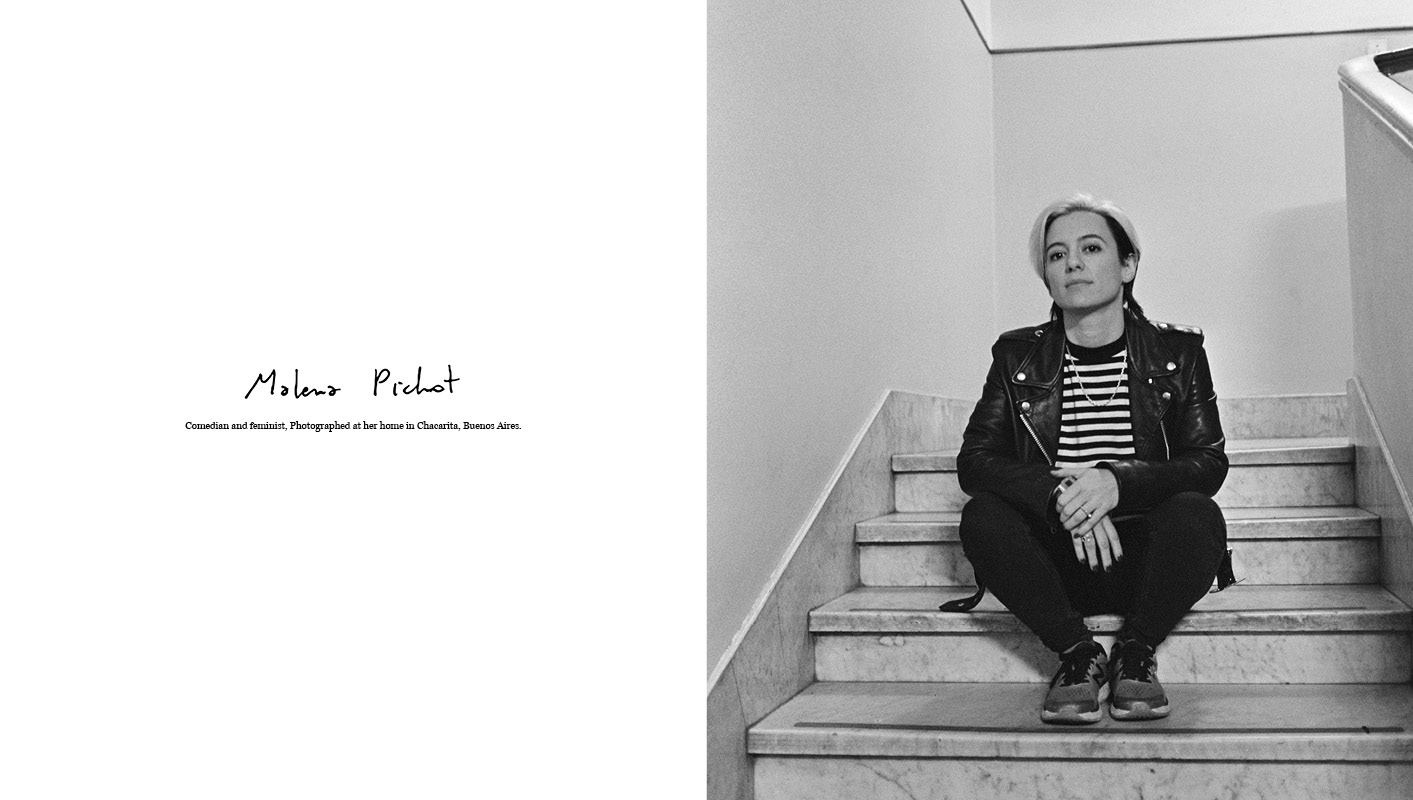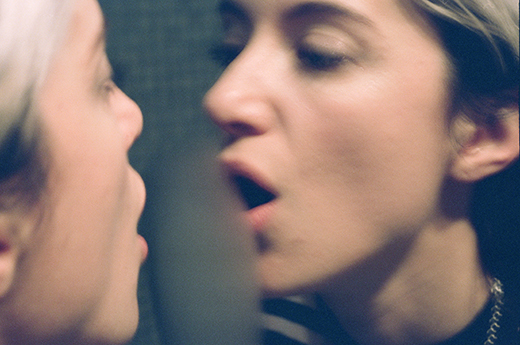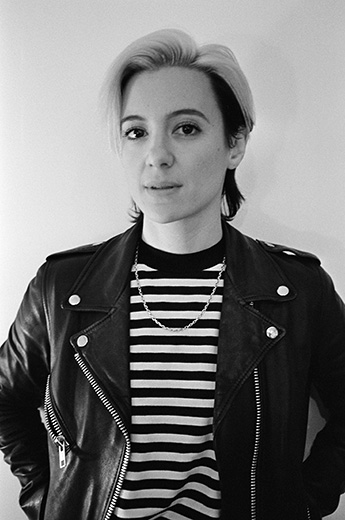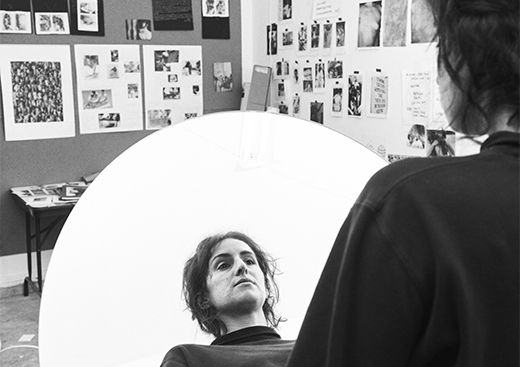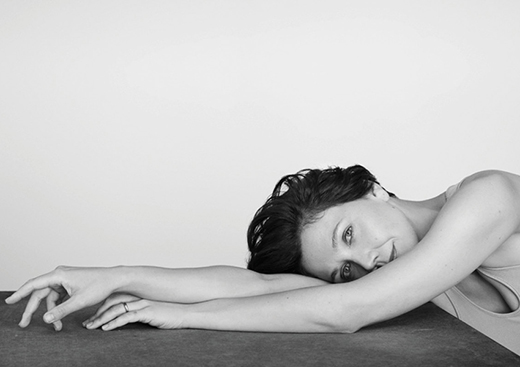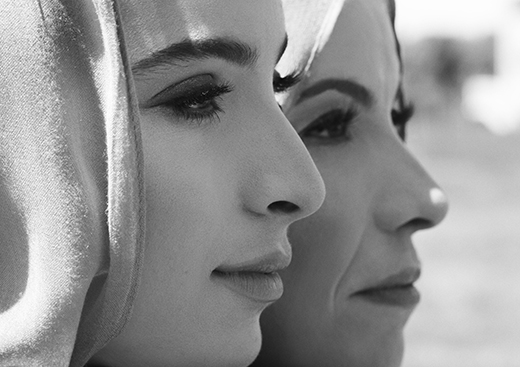PAOLA KUDACKI: Why are women in the place we’re at right now?
MALENA: What happened?
PAOLA: How is it that we ended up like this?
MALENA: I’m sure it has to do with our strength. We don’t have that much strength. I’m sure about that.
PAOLA: It’s a struggle for equality. I heard people saying that men think with their genitals and women think with their hearts. Is that how it is?
MALENA: It has to do with culture too. It’s hard for me to say it but it’s true; women think from their heart. However, younger women don’t.
PAOLA: So we’re working it out.
MALENA: I’m a pessimist in general. It’s weird that, being the pessimist I am, I’m so active in the feminist movement. It seems like I don’t have any other option.
PAOLA: So a few years ago after breaking up with your boyfriend you started to do videos and ended up making a career out of it. Is that how it all started?
MALENA: Yes. I was so embarrassed for feeling so down after a guy. I was ashamed of myself. I made fun of my heart being broken after a breakup. So I did some parody videos.
PAOLA: You were laughing to stay away from crying.
MALENA: Exactly. I was trying to get my dignity back. I didn’t want to be ashamed of myself anymore and I started to think more about this topic that I find interesting, which is the gender difference. I thought about women’s roles and the fact that we always suffer. Even though men and women get hurt after a breakup, there’s this certain dependency of heterosexual women. When I thought about that and about women’s roles and their feelings after they go through a breakup, I realized I was a feminist.
PAOLA: How old were you when that happened?
MALENA: I was 25.
PAOLA: 25 is the age of changes.
MALENA: That’s right. It’s a period when you go from one relationship to another. I had a long period of many relationships—like more than one thousand.
PAOLA: You look great for a 1,030-year-old woman.
MALENA: Yes, I’m 1,036 years old.
PAOLA: You look great. [Laughs.] What did your friends think about you being on YouTube?
MALENA: It’s really crazy right now because everything on the internet is going so fast. Back in the day, we didn’t have this trend of uploading videos and making them viral or this so-called YouTuber.
PAOLA: You never thought it would become something big.
MALENA: Not at the beginning. At first, I was playing around on the computer. I recorded a video just to give it a try and I uploaded it. I had a blog, and every time there was new software, I tried it out.
PAOLA: You grew up in the technological era; are you a millennial?
MALENA: Of course. My college friends read my blog. It was a small circle; I never thought it would become bigger.
I started 10 years ago, so I never talk about it. When I started, it was so much fun because I knew there were some people following what I did. I was hoping people would watch it but never that many people. I had a friend who told me things like, “You know, my cousin watched your videos and she laughed so hard”, “My friend watched it and he laughed. He found them really funny.” Even my mom told me, “My friends watched your videos and they laughed.”
PAOLA: It must be really weird knowing that you’re reaching so many people you wouldn’t imagine.
MALENA: Exactly.
PAOLA: Sometimes people share very private pictures and they don’t realize how far they can go.
MALENA: It happened to me too, but my videos were scripted and had eight hours of editing. Everything was premeditated. As social networks started, I had to work on it. I was depressed and when I edited my videos, I got distracted and I was able to forget about my sadness.
PAOLA: How did you come up with the ideas for your videos?
MALENA: That was the freakiest. I learned on my own; I was able to see the funniest things in my videos. I picked the good stuff and got rid of the things that weren’t funny. It’s like having a good ear for music.
PAOLA: Yes, either you have it or you don’t.
MALENA: Yes, I think it’s from watching comedy shows so much.
PAOLA: Where does your sense of humor come from?
MALENA: My dad used to tell jokes all the time in our family meetings, but no one in my family was a stand-up comedian like me.
PAOLA: When did this become your career?
MALENA: It happened a lot later. When people realized you could make money out of videos on the internet, many came to me to ask me how I did it. I told them, “If you’re doing it just for the money, you won’t make it. Never.”
PAOLA: Totally. You have to find your passion because you need strength to navigate the ups and down. If you’re not persistent you’ll never succeed.
PAOLA: How would you define your sense of humor?
MALENA: It’s very dark humor, cynical and kind of evil. It’s sort of a defense mechanism that I always had and still have. I try to solve everything using my sense of humor; I would hardly talk about my problems seriously, except when it has to do with feminism or issues that are not related to me. However, when they say, “Let’s talk about your feelings,” I make jokes.
The other day I found a video of me in elementary school. It was me talking the same way I do now but at the age of 10 years old, making jokes. They were very serious jokes. Some of my friends told me, “People were scared of you.” What? I was a big deal. [Laughs.]
PAOLA: Humor goes a long way because it allows you to say a lot of things that you can’t say in a serious conversation.
MALENA: You also run the risk of destroying someone when you think you’re being funny. That’s the dangerous part of comedy. Comedy brings people together—it’s like you know who you can make fun of so you stick to it, but when you get the feeling that you can’t make fun of this or that person, you have to cut it out.
PAOLA: At the moment I live in New York, but growing up in Argentina, I remember people making fun of each other’s appearances and that was a total norm. Is it still like that?
MALENA: You got to know how things work now. Shorty, big-nosed or whatever. People respect minorities but not really the way people look. Here, people still call each other nicknames based on the way they look. They respect the minorities; it’s like they’re more conscious than they were some years ago. As a comedian woman, I have certain privileges because I’m white and I’m straight. So I don’t have that issue of, “You can’t make jokes about this or that.” I don’t.
I just let everything spit out. I make jokes out of everything. I feel privileged; however, I don’t have as many privileges as men do. So I think this thing about not saying this or that because it’s not politically correct is something men made up because they can’t tolerate not being able to say certain things, that’s all. I’m not afraid of not being able to make a joke. I mean, I make jokes about rape, prostitution, everything. If somebody gets offended—it obviously may happen—I have to put up with that and see the best response I can give. I have to think if the person offended is right or not.
PAOLA: In Argentina, what inspires you to make jokes?
MALENA: We have all kinds of problems and I can’t believe how people who are not comedians can live there. How can they survive, especially people in Argentina? How can they survive without making jokes all the time? I find inspiration in injustices. I mean, I’m not inspired by them, but comedy is a way to deal with them. The inspiration comes at any moment. It’s nothing romantic at all; I’m at home and suddenly I think of something like, “Oh, let’s make a joke about this.”
PAOLA: Do you write them down?
MALENA: Yes. See? Now I have to write jokes about abortion, like “never had an abortion” is bad news [laughs] and I write that down. That’s how I do it; I write a sentence that may stick and be useful for my jokes.
PAOLA: What is feminism like in Argentina? Do you consider yourself a feminist?
MALENA: Obviously. I’ve been doing stand-up comedy for 10 years now. For eight years I’ve started my show saying, “Hi. I’m a feminist. I know what you’re thinking, they hadn’t hit her good.” I’ve said these lines for eight years and still today I know what they’re thinking.
PAOLA: For many years, men were the only ones allowed to be leaders in most cultures. Now slowly things are changing and there are more women taking positions of leadership and power. It’s an interesting time where women are learning also to be women leaders—not just trying to replace men in their ways.
MALENA: It’s about changing the concept of power. If we don’t, we will be doing the exact same thing men do. We’ll be changing only the gender; we won’t change anything else. In fact, to me, the concept of what a woman is doesn’t exist because the concept we know is what society has told us—it’s a cultural construction. The concept of man is also a cultural construction. The concept of power is what we need to change. What do people do when they have power? Although, thinking that society’s concept of power may change is very unrealistic. It’s like thinking, “Will capitalism fall?” No.
There’s a book by Max Fisher that talks about the end of the world. It says that even for younger generations, the world is more likely to end than capitalism. Younger people are apathetic, and I understand that: The world would end and we’ll never see justice. Of course, it doesn’t have to be like that; it’s just my opinion as a pessimist. There are many feminist organizations, groups, even political parties—I don’t serve in any political party because I’m a comedian, but I mean, there are many feminist organizations, and it happens that still in these groups, their base is patriarchal. We have the challenge of changing the concept of power, and it’s very difficult to do that because we don’t know any other model so far. We have to create a new one.
PAOLA: What would your ideal world be like?
MALENA: I don’t know. It would be a world without a geological clock. An ideal world would be one where the roles of men and women are not fixed, you know? For example, I haven’t had kids so far, because I know I wouldn’t have been able to do the things I’ve done if I had kids. It’s not because I don’t want to; if I was a guy, I’d already have three kids. I have a few friends who “made it” in life and have kids. I have girlfriends who did nothing more than become moms. Now, I have some other girlfriends who had kids and they’re battling. What I mean is that men have kids and are still free to keep working and keep doing what they do, and that bothers me.
PAOLA: Do you think you should have been born a man?
MALENA: No. I don’t want to be a man; I want a man’s freedom. If the world was different, we could be mothers and work. It’s not that we’re not able biologically; it’s a matter of culture. We were told we can’t. The thing is that everything is seen through a masculine vision. The world vision is masculine. In fact, man is a synonym for the word human being. Women are the other thing. Women themselves look at everything with this masculine vision.
Certain things don’t happen when we speak English, because English is a more inclusive language, but in Spanish women say, “Uno sabe lo que uno quiere,” you know? We use the male subject instead of using the female subject. It shouldn’t be like that; women should use the female subject and say, “una.”
PAOLA: In English, it’s very common to say “hey guys” referring to everyone including women in the group.
MALENA: Now here, young people are using the word “chiques” to include women and men.
PAOLA: I like the word “human.” I feel it’s a word that includes us all.
MALENA: It’s a beautiful word.
PAOLA: It’s better in English, because in Spanish it’s “humano” and that is a masculine word as well. Even in the Latin origin, “Homo sapiens” which translates to wise men or in spanish, “hombre sabio” as if women are not wise.
[Laughs.]
MALENA: See! No chance to win it!
—


